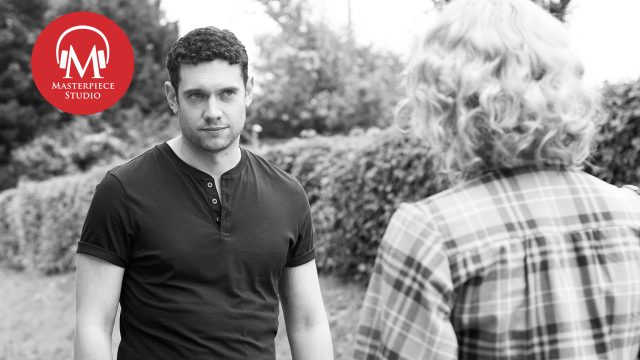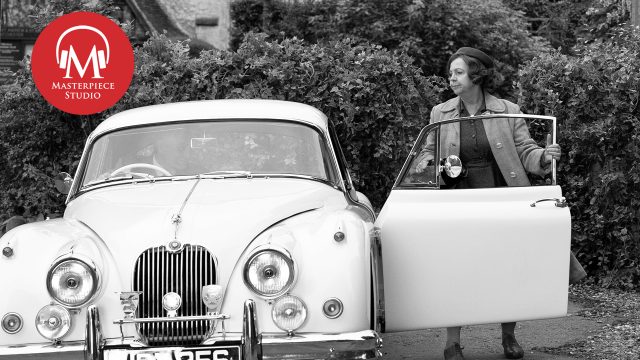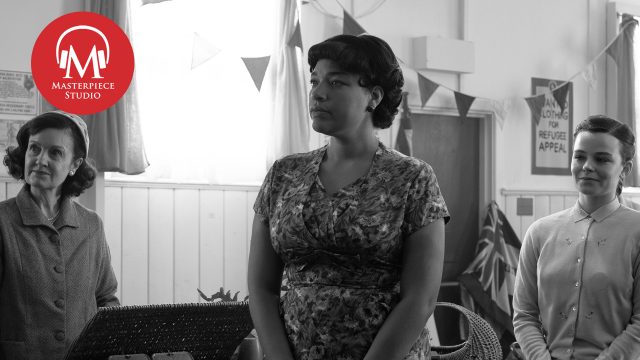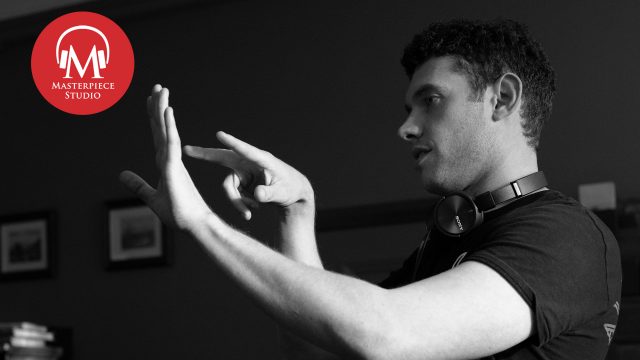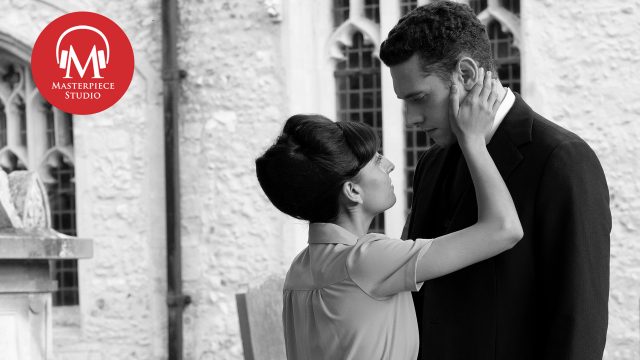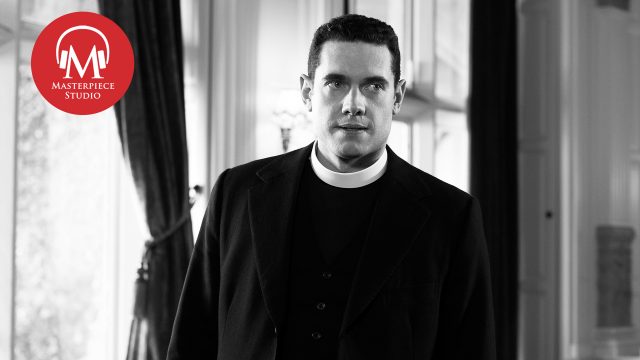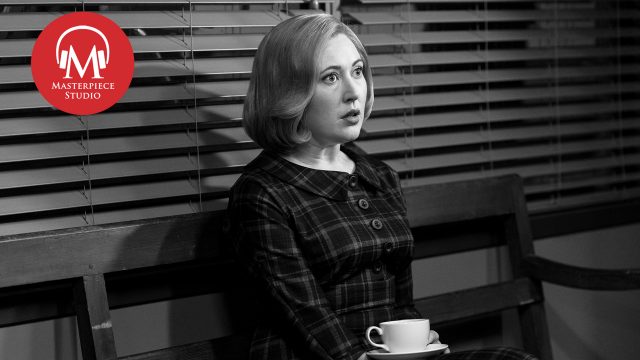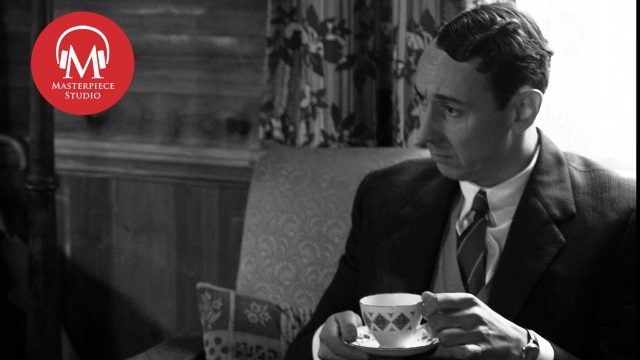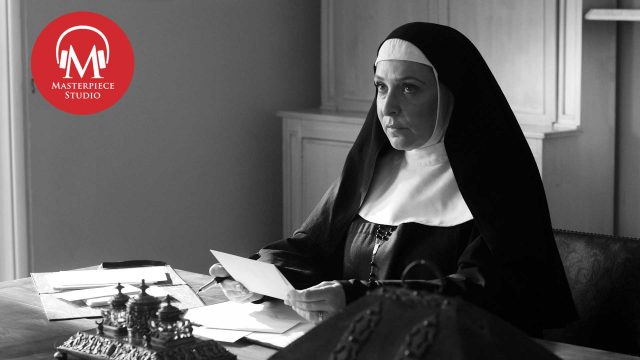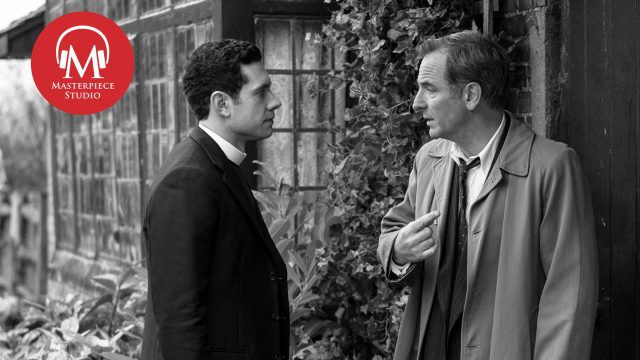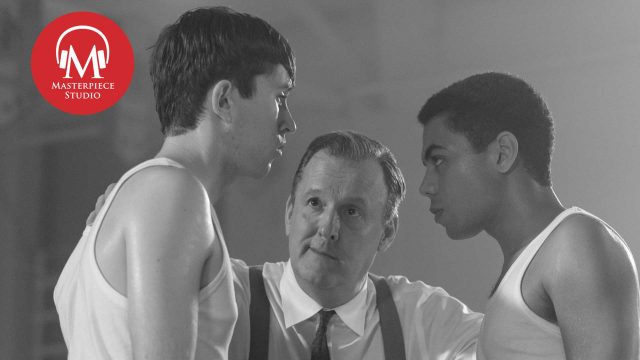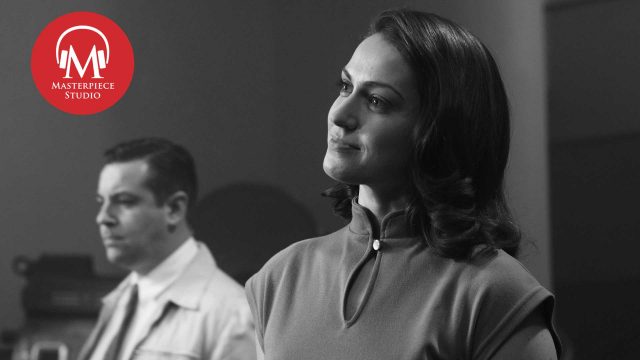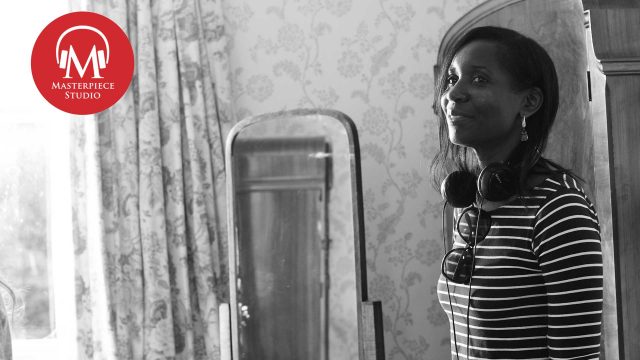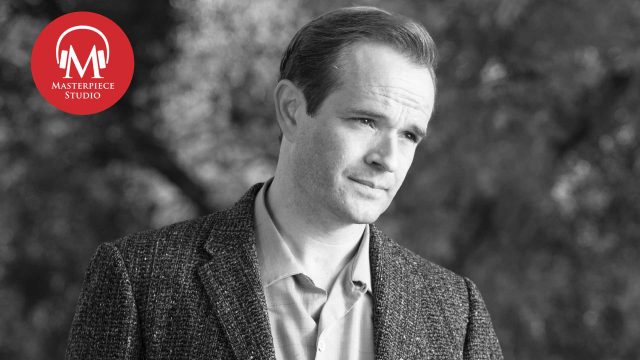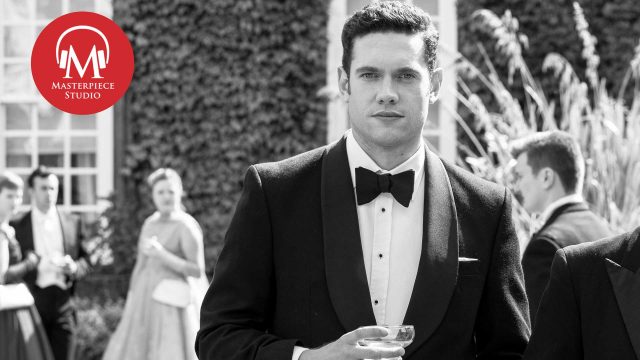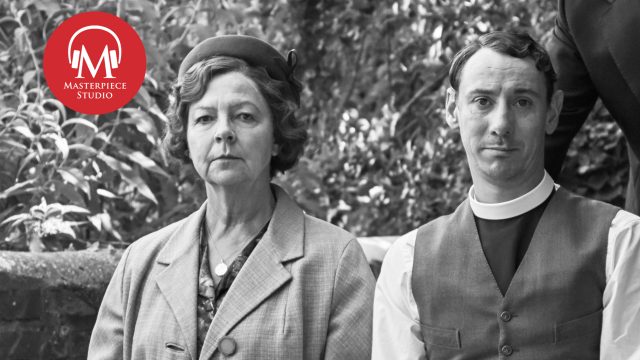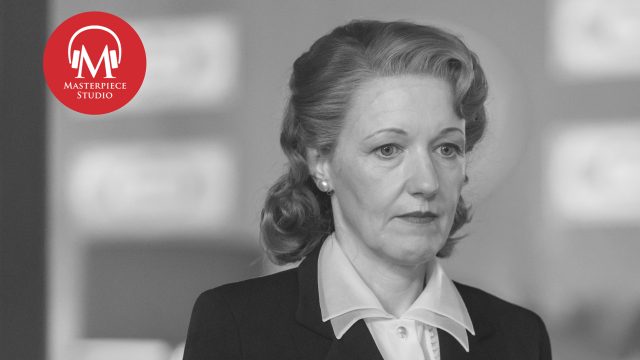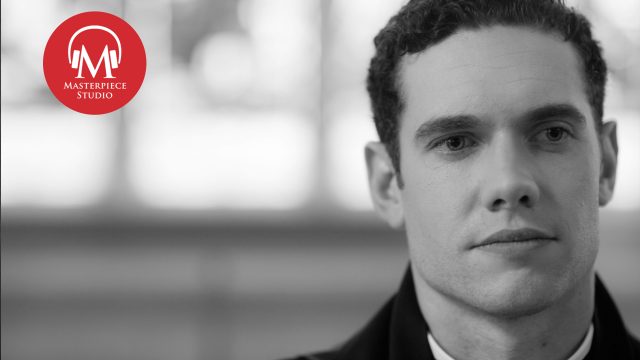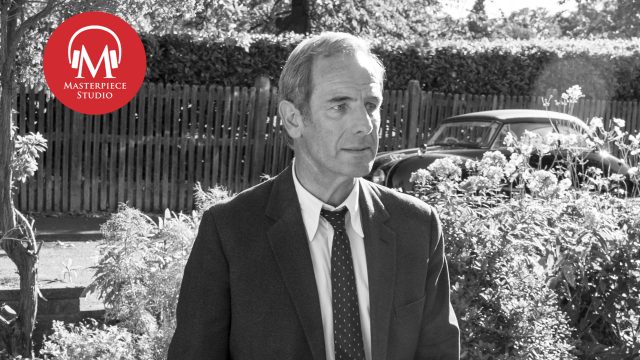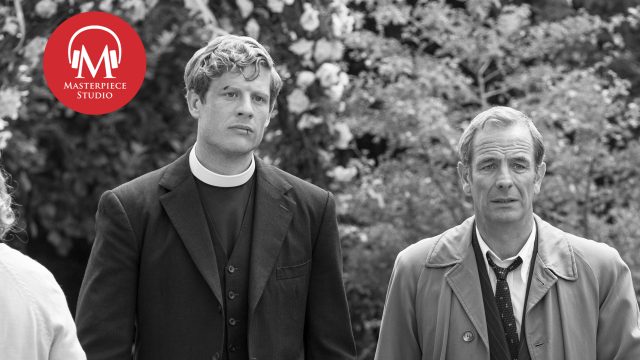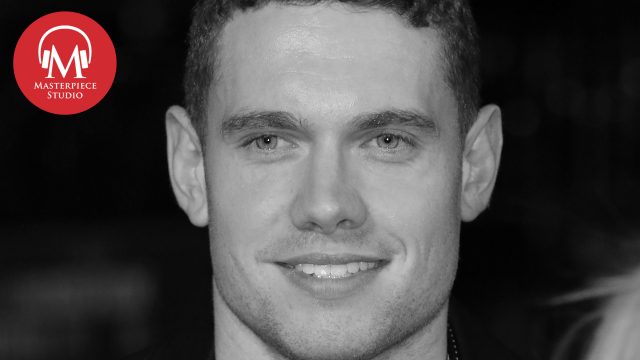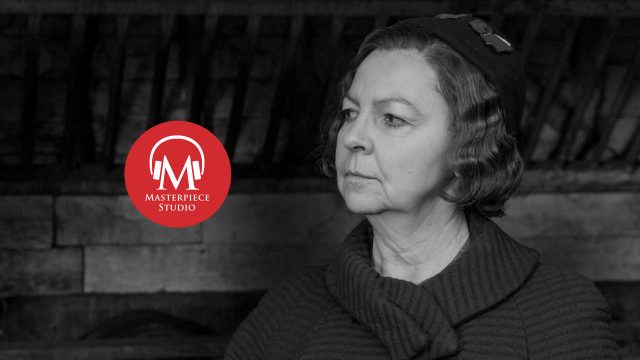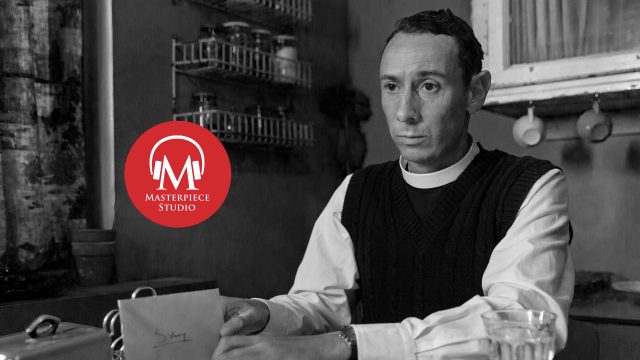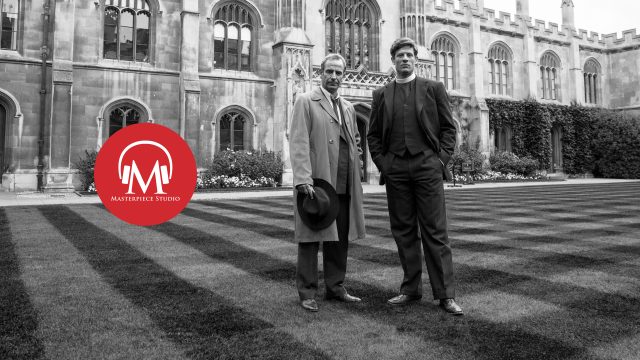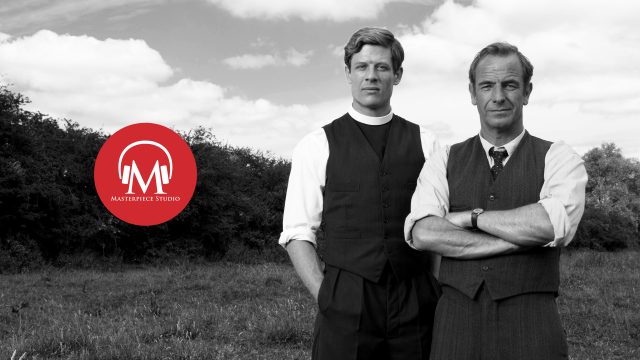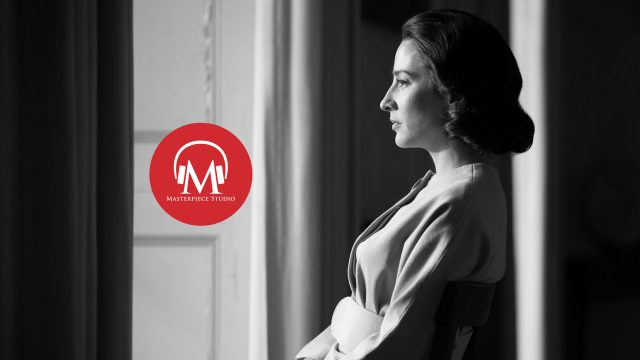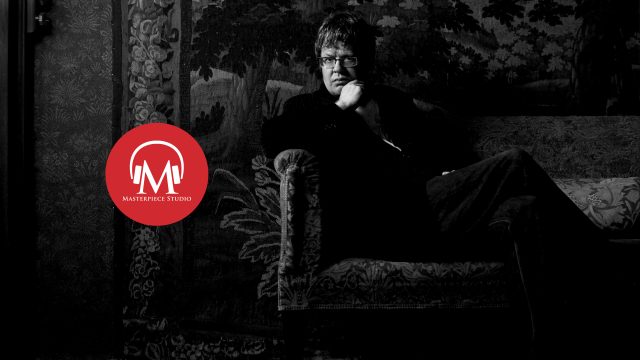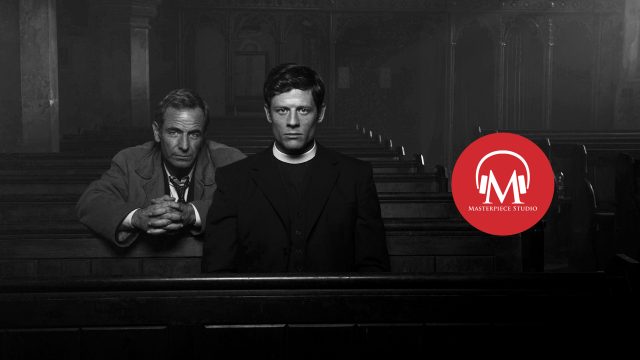In the six seasons of Grantchester, the action has mainly centered on the titular village, along with crime in nearby Cambridge. For the first episode of series six, executive producer Emma Kingsman-Lloyd and head writer Daisy Coulam shift the action to a nostalgic British holiday camp — with murder and drama to spare.
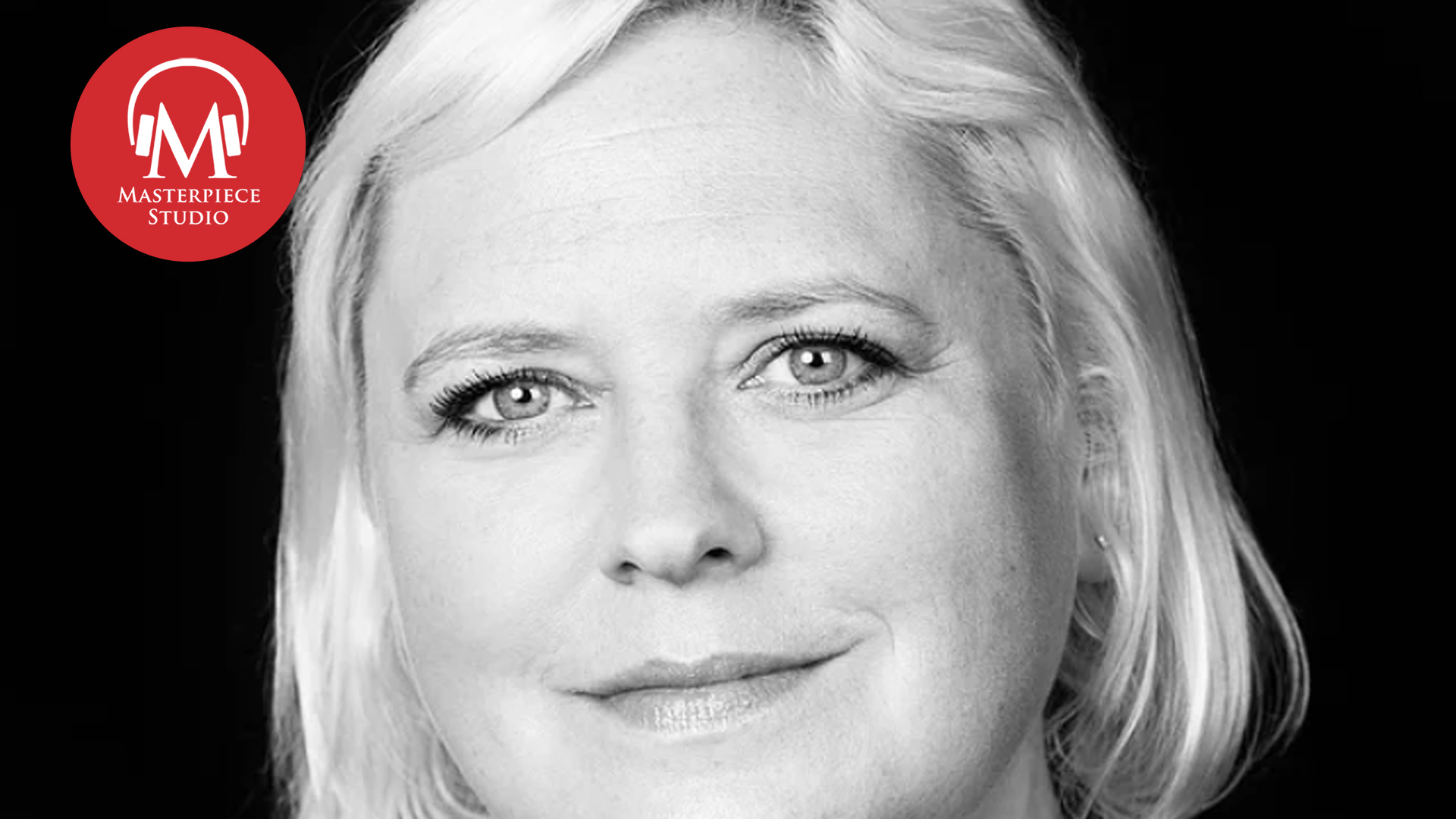

Executive Producer Emma Kingsman-Lloyd Knows Where All The Bodies Are Buried
Released 35:48
Related to: Grantchester, Season 6
Download and subscribe on: iTunes | Spotify| RadioPublic
Transcript
Jace Lacob: I’m Jace Lacob, and you’re listening to MASTERPIECE Studio.
CLIP
Tannoy: Welcome to Merries, where there’s never a dull day! And the sun always shines. Leave your worries far behind you and forget about everyday strife. We’re here to put a smile on your face.
Jace And with that, we’re back to the cozy corners of Grantchester. Well — almost back. This first episode of the sixth season of the show heads to a traditional British holiday camp for a good week of sun, swimming — and, naturally, cold-blooded murder.
CLIP
Cathy Promise me there is not a murderer on the loose. What about the kids?!
Geordie Wouldn’t fancy his chances against our lot. We don’t know if it’s a murder. Not for sure.
Jace Our gang gets wrapped up in the investigation, of course — this is Grantchester, after all — but they head back home with newfound appreciation for each other — and an ominous new threat.
CLIP
Bryan Your curate. I saw him with a man. They were in bed together.
Will That can’t be the case.
Bryan You doubting what I saw?
Will I’m doubting your reading of the situation.
Bryan What other way is there to read it?
Jace There’s much to unpack this season — but today, we’re turning beyond the camera and behind the scenes in a new conversation with Grantchester executive producer Emma Kingsman-Lloyd, who has a lot to do with her long-running series’ reputation as a “happy place” to work, act and tell gently probing murder mysteries. She’ll discuss producing a period drama during a global pandemic, 1950s British holiday camps and how Tom Brittney and Robson Green help keep spirits light on the village green.
Jace And this week, we are joined by Grantchester executive producer Emma Kingsman-Lloyd. Welcome.
Emma Kingsman-Lloyd Hello. It’s lovely to talk to you.
Jace And finally to talk to you. We’ve heard so many positive things about you from everyone involved with Grantchester. Grantchester has been described by many of the guests we’ve had on from the production as their ‘happy place.’ Emma Kingsman-Lloyd, why is Grantchester your happy place?
Emma Oh blimey. We coined that, I think it was Diedrich Santer who was our previous exec producer when I was a producer back on series two, I think. And very early on, we realized that it really was a happy place. We kind of we brought together a fantastic group of actors and a wonderful crew, and we all just had a huge amount of fun. And every series we thought, you know, ‘Something is going to come up and it’s not going to be the same and it’s not going to feel so much fun.’ But it just has, you know, that atmosphere of joy and fun has just continued from series to series. And it’s really lovely that that’s continued and that people coming in new to the show still get that vibe, which is, you know, it’s fantastic. And, you know, the cast and crew are brilliant. A lot of it is down to Robson, because he’s just the nicest man on the planet.
Jace You’ve been with the production since the very beginning. You’re now in the midst of shooting series seven. What would you say is the show’s greatest strength?
Emma I think it’s absolutely the characters, I think I think people love the whodunnits that, you know, they really enjoy the whodunnits, they really have fun with the crime stories. But I think the, you know, the endearing longevity of the series is absolutely the characters. People are invested in Geordie and Will, you know, and, you know, it will now in the same way that they were with Sidney back in, you know, in early series. And they are fantastic characters to spend time with. And it’s a testament to Daisy’s genius and the other brilliant writers that we have that they continually come up with fantastic storylines that really resonate for people. And it also it looks gorgeous. And I think, you know, the world wants a bit of gorgeous Grantchester every year, especially when it’s wintry and we’re in a pandemic. I think people really enjoy that escapism.
Jace I mean, to me, change might be the eternal constant within Grantchester. Each series sort of inches or even leaps its way forward in time. And the viewers are privy to seeing society shift and progress around these characters. Is that the benefit of a period drama like Grantchester to capture a particular moment in time and reflect our own simultaneously?
Emma Absolutely. I mean, I think for me, one of the really interesting things about the show is that unlike certain other period shows that we all know and love that have also kind of moved forward in time. We only ever move forward one year per series. But this shift, because we’ve gone from you know, we started in 1953 and we’re through to 1958 now and I think that it was such a seismic shift in the UK, probably less so in the US, but certainly in the UK it was such a change between kind of postwar austerity through to kind of, you know, real hope and joy for the future. And I think that modern audiences can really, you know, they really understand that and really enjoy the way the characters are growing through that period of time without being very kind of, you know, historically, you know, specific about things. But we’ve really enjoyed kind of really pushing the characters as their world opens up.
Jace I mean, it is interesting, looking back at series five, which sort of was about Eden and happiness, sort of summed up in Harold MacMillan’s ‘Britons have never had it so good,’ speech from 1957. This series feels darker. It does seem to sort of mirror what we’re going through now. It’s easy to look back at sort of pre-pandemic times and say, ‘Oh wow, we, we had it so great. It seems almost Eden-like,’ even though it wasn’t. But there is that sort of vein running through this season, whether intentional or not, that clouds are on the horizon. Things are not as light and bright. We are sort of in a midst of struggle which sort of plays itself out, without spoiling, in several characters. Does it seem that way, looking back at series five, that that there was a sort of demarcation there between happier times and less happier times?
Emma Yes, yeah, I think I think absolutely. And I think I think you’re absolutely right. The interesting thing is that obviously we story lined this before the pandemic, but obviously the writers were crafting the scripts whilst, you know, as the pandemic unfolded. And I think it absolutely did affect the way that they approached it. It would have been interesting to see how we would have approached these stories and whether or not there would have been any difference in the scripts if it wasn’t for the pandemic. Because obviously, you know, it’s absolutely you know, it’s touched everything, it’s touched everybody’s lives in myriad different ways. And I think it’s really interesting. And I think that that is something that, you know, the writers themselves would probably say kind of it did affect how they were approaching stories. And so possibly we may have taken the series and kind of treated the storylines in a slightly darker way than we would have done if it hadn’t been for a pandemic. But as you say, you know, kind of looking back on series five, yeah, it seems that is another world away.
Jace Now, this is sort of a bigger picture question. In nearly 200 episodes of MASTERPIECE Studio, I realized you’re the only the second non-writing executive producer we’ve had on the first being, I think in only the second or third episode six years ago. Can you just quickly explain a little bit for viewers what a few of your numerous duties are on Grantchester?
Emma Yeah, sure. So as the exec producer, it’s my role to bring the series together. So obviously I employ a producer and I know in America it’s much more common to have kind of producer-writers who are showrunners of the series. We have a slightly different system on Grantchester. So Daisy is lead writer and exec producer, but she’s not a kind of hands-on producer-producer as it were. So that’s my role. I bring in the producer, I bring in the directors and all the heads of department and sort of and then work very closely with the script team as well, kind of crafting the stories. And so it’s very much kind of editorial, creative and production as well. It kind of covers everything I do. So that’s a very long winded way of explaining my job. But I think, you know, having been on the show since the beginning, I’m also kind of I think I’m as a part of the DNA of the show, as Daisy is, and we work very closely together crafting the look of the show and making sure that everyone who comes into the show in terms of crew and directors and writers really understand what it is that we’re looking for.
Jace I mean, I want to talk about Daisy a little more in a bit, but I am curious whether the fusion of the two of you is sort of typical within the UK television industry? It does seem like you two have an amazing creative partnership. Is that sort of the typical executive producer/head writer arrangement, or is this situation more unique?
Emma We think it’s unique. I think an awful lot of kind of execs and producers have very, very close relationships with their writers. They’ve become really great partnerships. But Daisy and I do think it’s something special. You know, we’re very close. We’ve worked together for a long time. We understand each other really well. We’ve worked together now, not just on Grantchester, but also we did a project called Deadwater Fell a couple of years ago. And we’re working on other ideas together as well. And it is a really close friendship, which is, again, one of the greatest things that I will take away from working on Grantchester, as well as being so proud of the work that we’ve done over the years. And long may it continue, but to then have such a great friendship with Daisy is, you know, it’s kind of separate from the office as well. It’s lovely. It is really, really lovely.
Jace What an adventure this sixth series of Grantchester has been. And I mean that aside from the plot itself. Can you take us back to the early part of 2020, when the sixth series had been greenlit — what were the challenges that you anticipated the show would face, you know, eight episodes instead of six, for example, and what was the reality?
Emma Yeah, I mean, to be honest, that was the biggest thing, that was the biggest issue for us was when it was kind of, you know, we had eight episodes to play with, which was fantastic. You know, we were so excited about it. But we knew that we have this great serial storyline. But then, as ever, you know, you kind of sit down and think, ‘Can we come up with eight really cracking crime stories?’ You know, how will we craft the series? And that was absolutely the biggest challenge. You know, we’re lucky that we knew you know, we know how the show works on a practical level, everyone was really excited to come back. You know, we had returning cast and crew and everyone was excited. And then, yeah, the brakes were put on. And we would firstly, we were supposed to shoot in sort of June, July time. And that kept being pushed back and pushed back and pushed back. And obviously, we kind of you know, we you know, we were it sort of sounds slightly awful to be talking about things like kind of the worry about making television when people were going through, you know, real tragedy and real difficulty. But from a kind of just from a production point of view, it was challenging. We never knew when we were going to start and we kept pushing it back. And in the end, we when the lockdown was eased and we worked out a strong sense of how we would shoot and keep everybody safe, because that was obviously the most important thing. And we went for it. So we were kicking the series off with a summer episode set on their summer holidays and we were suddenly faced with having to shoot it in October, and October in London and Grantchester is not very warm. And it was so you know as well as the kind of, you know, the logistics of COVID and keeping everybody safe and making sure everybody was completely socially distanced, all of those logistics, we also have the creative logistics of how do we make this look like summer? How do we convince Kacey Ainsworth to wear sleeveless dresses? How do we get our actors jumping in lakes? A lot of things that we had to do. And they were all amazing. They just really stepped up. And we had some real issues with episode one specifically because we did have a couple of COVID issues with actors. We had a couple of actors that we really wanted to use, but members of their families were shielding. So we had to work out creative ways to shoot the show and to make it seem seamless and for nobody to know when they were watching the episodes that certain actors weren’t in certain scenes and that certain things that you think look like areas of Merries’ Holiday Camp aren’t that. Yeah, it was it was a real challenge. And the team were just fantastic.
CLIP
Roy Davenport Party?
Will That’s us.
Babs and Roy Welcome to Merries!
RoyI’m Roy Reeves, your most venerated host. This the other half, Babs.
Babs We met at castanet class.
Roy Yeah, I don’t know what it was: we just clicked.
Babs and Roy Click, click!
Jace I will say you don’t notice. It’s pretty remarkable how especially that first episode. It is seamless. It’s truly incredible. The whole time I watched it with my jaw on the floor because I couldn’t believe that you pulled off recreating a 1950s’ British holiday camp in the midst of a global pandemic in October 2020. It’s insane to me. But how production is inherently stressful, it’s never a calm thing, even, I imagine, on a ‘happy place’ like Grantchester. How much more stressful was the production compared to other years?
Emma Yeah, it was a lot more stressful, but it was more stressful, oddly, from the little things like big logistical things, you go, okay, you know, it’s what we do as an industry. You sit down with a piece of paper and say, how are we going to do this? The little things were more stressful. The fact that we couldn’t shake hands with people, the fact that, you know, everybody’s wearing masks and it is a place where people laugh and joke and have fun and everyone was standing two meters apart. You know, usually on a usual series, I’m on set probably kind of a couple of times a week if not if not at least once a week. And during the whole of the shoot for Grantchester six, I went to set three times and I couldn’t, I wasn’t there. Daisy was barely there. We were there on Zoom calls. But, you know, we weren’t able to be as involved kind of from a personal point of view as we really wanted to be. And that was difficult. That was really tough. And I know the actors found it very difficult that they couldn’t obviously they were all being tested three times a week. So we were able to film them closer together. But the minute the camera, you know, the minute they said ‘Cut!,’ everyone had masks back on and everyone was stepping two meters apart. And it was, you know, it was difficult. It was a tough way to work. And, you know, the fact that Robson and Tom kept everybody’s spirits up was just, it was wonderful.
Jace Before this next question, a brief word from our sponsors…
Jace I want to dig a little deeper into that first episode. The first episode of series six gives us a richly recreated 1950s holiday camp in the form of Merries’, complete with dozens of guests and a lot of interaction between the cast, guest stars and even background actors. How on earth did the production pull this off and make it look quite so effortless?
Emma Well, the main thing obviously was testing. Was testing, testing, testing, all the actors and all the guest cast and all the supporting artists that we were kind of near to the actors. And basically all of them, they were all being COVID tested three times a week and we kept them very separate from everybody else. So they were separate from the crew. We just brought them in to do their scenes and then we sent them off again, we had marquees set up, which, again, were kind of they were all socially distant. So once they got back into the marquees, they were all sat two meters apart. And then they were all really good about kind of when they went home, making sure that their families, because everyone was pretty much in lockdown, but making sure that their families were also kind of, you know, semi-isolated from them. It was an interesting logistical exercise, finding that many marquees to accommodate more people. But then things like, you know, when we were looking for locations, obviously shooting outside at Merries’ was slightly easier because we were outside. But then when we did do, there’s a lot of scenes in the Merries’ ballroom, we had to find a space that was big enough to accommodate the amount of actors and guest cast and extras that we had. And, you know, we had to create some of that. As I say, hopefully you won’t see the joints. And we use some green screen to kind of put certain people in when they weren’t actually there. A lot of tricks, a lot of tricks were employed in that.
Jace I mean, I do want to tell listeners they shouldn’t try to book their own stay at Merries’ because the entire holiday camp was specifically built for Grantchester. I believe the chalets were a series of abandoned army barracks in Aldershot. Is that right?
Emma That’s exactly right. Yes. In fact, the first time we went there, when we got there on a reci. And Michael Fletcher, our wonderful production designer, just said to me, ‘Honestly, just just imagine it. It will work. It will work.’ And it was fantastic. That was one of the days that I got to go to. That was when they were doing the exterior of Merries’. And I just walked in there and it took my breath away. It’s absolutely brilliant. It’s the biggest design that we’ve done on the on six series.
Jace It’s, I mean, extraordinary. What went into that sort of careful creation, and did the design sort of evolve? Is it meant to evoke a sort of Butlins’ or Pontins’ or similar?
Emma Yeah, absolutely. Very, very much a kind of Butlins / Pontins of yesteryear. Interestingly, my mum had been to Butlins many times in the late ‘50s, so I asked her a lot. But it’s I mean, it’s meticulous research from Michael and his team and then sort of evolving it into our own version. And it was also, you know, we’ll admit there was a little kind of nod to Dirty Dancing in there. Daisy and I are big Dirty Dancing fans. So we wanted to have a little bit of a Kellerman’s vibe. But, yeah, it was just kind of evolving it through discussions with Rob, the director and Michael and what Daisy wanted in terms of the look for the holiday camp. And but yeah, I mean, just Michael is so clever and kind of putting something together that exceeded anything that we thought we’d be able to do.
Jace I mean, given that so many people were under lockdowns in 2020, where did the idea for taking the characters of Grantchester on the road, as it were, come from? Was it a unique opportunity to get these characters outside of the familiar?
Emma No, to be honest, that was something that Daisy had come up with before lockdown. So she really loved the idea, you know, especially after the end of series five, where Will finally sort of threw off the shackles, his kind of mental hang ups, as it were, we really liked the idea of starting series six, kind of with everybody together in a different space, having the happiest time that they could, you know, and genuinely giving them a moment of respite before kind of the seriousness and the darkness of what’s about to unfold hits them and really letting them all, you know, even Mrs. C. Mrs. C is having a whale of a time. She loves it.
Jace Best legs!
Emma Yeah, lovely legs competition!
CLIP
Sunny And our final pair of pins…
Jack Go on Sylvia.
Sunny Contestant number six is housekeeper to Reverend Davenport and his curate Mr Finch. What did God say after creating man? I can do better. And these legs are living proof.
Emma She is living her best life at that moment. And they are making what seem to be wonderful family memories, and then obviously we sort of pull the rug out from underneath them all.
Jace It’s Grantchester, after all.
Emma Exactly, we’re mean!
Jace No one can be too happy for too long. I mean, it’s Grantchester. I mean, one of the things I loved is that it was very unexpected because Grantchester has has largely not entirely, but largely with a few notable exceptions, sort of focused on the village of Grantchester and the university town of Cambridge. And by removing those landmarks, this episode sort of offers an unpredictability. It shifts the ground. And we are sort of, we get a moment of happiness before we return to sort of the murder capital of Britain in Grantchester. But I thought it was a great way to start this series. And there was this sense of a beautiful escapism to it to get to see these characters sort of enjoying themselves. Merries’ seems like the perfect place, ‘Where there’s never a dull day and the sun always shines,’ as Babs says on the tannoy. But there is darkness lurking beneath the surface. What does the British holiday camp represent to you as an idea? And how is Grantchester subverting that notion here?
Emma I think it represents a kind of real, a very unreal nostalgia, to be honest, I think. I think that we, especially in this country, especially at the moment, we seem to have a kind of you know, we have a ruling class who want to look back and not forward. What we’ve always tried to do with Grantchester is to say ‘You can look back with rose-tinted glasses, but that’s not the truth of what the world was,’ you know? And I think that it was really important for us, as I say, to have real fun with Merries’ and to actually give the audience things that they possibly remember or they remember their grandparents talking about. There is a there is a nostalgia for a kind of Butlins/Pontins, as you say, that people think they know what they are. And then, yeah, as is as is our want in Grantchester, there is always something, there’s always a bit of grit. There’s always some, as somebody once said ‘a bit of vinegar in the sponge cake.’ You know, we always…I love that line. That was from a reviewer on series one and I’ve never forgotten it. And it’s something that we always do live up to because you can be nostalgic for the past, but that past never existed, and that’s always been really important for us. Is to say, ‘Look, that you may you may hark back to a time where you think everybody left their backdoors open and homosexuality didn’t exist and crime didn’t exist and murder didn’t exist, but they really did. And people lived very difficult lives.’ And obviously, you know, Grantchester isn’t a social commentary, but we always want to kind of put a little bit of that in there.
Jace The holiday has its casualties. There’s a murder, a broken heart. And Leonard Finch, who is caught in bed with Daniel Marlowe by Merries’ photographer Bryan after Leonard turned down his advances, is sort of the main casualty here. We end on an ominous image of a photograph being developed. How will this one moment come to haunt Leonard?
Emma Oh, hugely, hugely, it’s going to cast a massive shadow over and over everybody, because whilst he is finally comfortable with who he is, very comfortable with, who he is, very happy with Daniel, the world is going to crowd in on his life and make things very hard. And it’s going to you know, he has to ask a lot of questions about who he is. Will’s going to have to look at how far he will go to save his friend. And it’s really difficult. And Mrs. C, who was slightly been in denial about Daniel and Leonard because, you know, it’s her boy and she loves him and she’s come to understand what Daniel is. But when she’s confronted with that publicly, it’s going to be really, really tough for her.
Jace There’s been a noticeable move on Grantchester to include BAME actors, not just in the background, but in guest starring and main roles. I mean, this is a period show and the effect is a significant one. The sense that the past wasn’t entirely white, which shouldn’t seem revolutionary, but actually does for a period drama. Can you speak about BAME inclusion efforts on Grantchester?
Emma I mean, it has always been really, really important to us, right, from series one. But I think that, you know, kind of in the very earliest series, we were more conscious of explaining the roles of BAME actors or characters within the story, and actually as the series has gone on and we’ve got a place that the world has opened up. We’ve wanted to do that less because I think it’s really important to have representation and to not. You have to sort of apologize for that representation. I think it’s very, very important for us to have actors of color, you know, LGBTQ actors, disabled actors, and not make a massive issue out of it because it’s not it shouldn’t be.
Jace You mentioned sort of disability. There are several new characters, this series, including Melissa John’s disabled police secretary, Miss Scott, whom I have already come to adore and whom viewers will come to fall in love with when she shows up later this season. Where did the idea for Miss Scott come from, and why did you ultimately cast Melissa?
Emma We cast Melissa because she was the best actress who walked through the door. We didn’t create Miss Scott as a disabled character. We just knew that we wanted a — another show that I’m obsessed with, more so than Daisy, but Daisy quite loves is Mad Men . And we really wanted a kind of Joan from Mad Men-type character to give the boys a run for their money. And so Daisy created Miss Scott and we just met Melissa and thought that she was the most brilliant actress. She’s extraordinarily funny and beautiful and very sassy, and she was just great. And so her disability was not a thought when we cast her.
Jace We’re talking to Melissa in a few weeks time. But I’m curious to get your perspective as the the EP on Grantchester. I mean, do you see her casting is a move for representation of visibly disabled actors or people with limb differences? And do you then envision a storyline for Miss Scott that would deal directly with her limb difference, or is representation and visibility the end goal here?
Emma I think in the first instance, as I say, we cast her because she’s absolutely fantastic and we made a conscious effort with the first with her first series, not for it not to become a storyline we did. I think that is something that kind of moving forward. We don’t have any plans for a storyline that is about her limb difference at the moment. In fact, we’re having quite a lot of fun keeping her quite mysterious and enigmatic. And there’s a lot of comedy to be had from the truth about Miss Scott. We only learn her first name in series seven. You know, we’re having a real fun with her. And so it’s it’s she’s if that was a storyline that Melissa wanted to explore, then I think that’s absolutely something we’d do. But certainly at the moment, we didn’t bring in an actress with limb difference to in order to tell a story in that realm.
Jace Grantchester has evolved a great deal from its earliest days, which hewed closely at times to James Runcie’s novels before veering off in its own direction. Part of that was necessity, as there were no more books to adapt. But it also feels like a true blessing in the end, as it gave the show its own creative direction and freedom. Do you look back and see it that way that it enabled you to sort of take the show wherever you needed or wanted it to go?
Emma Yeah, I mean, truthfully, I think, you know, from very early on, James Runcie was so generous and said to us, you know, look, here are my books. They got you know, Sidney has a very specific story line that runs through all the books. They do jump many years difference between series. And so quite early on, I think kind of around series, too. James understood that we would be stepping away from his his work and has been so supportive of that. And I think that in itself has really given Daisy the space to really fly and go off and kind of take it in different directions because we have James’ blessing to do that, which is, you know, has been great. And he still, you know, a really big supporter of the series. He still reads all the scripts and watches all the episodes before they go out. And I think he really enjoys it because I think he sees it as something very different to his books now. But it’s given Daisy the opportunity…and obviously we took Sidney in quite a different direction. But he was still ultimately, the kind of Sidney that James had started in the books, and obviously when we really, I think, kind of took off in a different direction was when Daisy created Will.
Jace I do want to talk about Will Davenport. I mean, he’s so different from his predecessor in Sidney. And his dynamic with Geordie is likewise very different. But Will, to me, seems to capture the very heart of the show, this notion of struggling to be good and to do good while being inherently imperfect and human. Do you see Will as sort of embodying the show’s morality in that way?
Emma Yeah, absolutely. Absolutely he does. I think it’s you know, he’s yeah, he’s he’s a young man, kind of slightly out of step with the time with the other young men of his generation, I think. And as you say, he struggles. He has a very, very strong moral compass. And, you know, he has very strong calling and a very strong faith, which Sidney didn’t have, bless him. He used to kind of veer off quite a lot from his faith. But Will has that and he struggles. He struggles with a lot. And he does struggle to be the best man that he can be, which sometimes does kind of…he puts up kind of huge barriers in his own way, and I think he’s a great central character for us to explore that sense of morality and justice. And again, its resonance for a modern audience.
Jace I mean, series six has just launched here, you’re in production on series seven, with Tom Brittney stepping up to direct episode three. What is it like having the actor playing your lead step behind the camera?
Emma To be honest, when we discussed it, first off, I was terrified. Because, you know, you don’t know, you don’t know how well it’s going to go. But I mean, no I’m only joking. He’s fantastic. He was so committed to it. We talked about it a lot. We’ve been talking about it since series six. And he doesn’t have a huge amount of experience directing on previous things. But we, you know, he’s so committed to the show, he knows it inside out and backwards and he was so prepped. I mean, you know, most of our directors come in and they are really, really prepped for work. But I mean, Tom was completely on it because he was having to wear two hats and we did certain things to help him. A little sneaky peek at series seven, but in his episode, there’s a little bit less Will so that we could give him a bit more time behind the camera. But most of the time he, you know, he’s having to direct himself as well as everyone else. But you know, everyone was fantastic. But we’ve talked at length to Robson about it. And he was so supportive and made it quite easy for Tom to to do that, although sometimes gets fits of the giggles and Tom has to tell him off, which is quite funny. Yes. And, you know, he’s been fantastic. He was really strong on the scripts, as you would imagine, and really kind of great visually and brilliant with all the actors. So it’s been a real joy, to be honest.
Jace Emma Kingsman-Lloyd, thank you so very much.
Emma Thank you.
Jace We always try to avoid spoilers here on the podcast, but this season of Grantchester, the neatly serialized format of the plot might make that promise difficult. So here’s what we’ll say looking ahead to our next episode: keep a close eye on curate Leonard Finch.
CLIP
Leonard This is all my fault for, for being so careless. Meeting up, walking together, going on a holiday…
Jace We’ll speak with longtime podcast favorite and Grantchester regular Al Weaver on October 17.
MASTERPIECE Studio is hosted by me, Jace Lacob, and produced by Nick Andersen. Elisheba Ittoop is our editor. The executive producer of MASTERPIECE is Susanne Simpson.
Grantchester Podcasts 30 More Podcasts
MASTERPIECE Newsletter
Sign up to get the latest news on your favorite dramas and mysteries, as well as exclusive content, video, sweepstakes and more.











